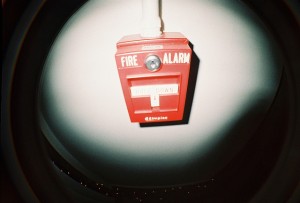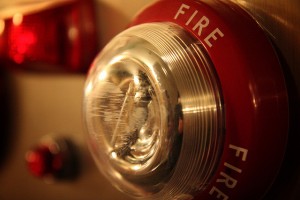 In an unpredictable world, one thing is certain, we all want to protect what’s ours. Whether you’re a business owner or a homeowner, you want to keep safe that which you’ve worked so hard for. One of the most effective ways to do that is to install a security system. Well, what exactly is a security system and what makes it a complete security system? Security can be defined as, “the state of being protected or safe from harm,” and system can be defined as, “a group of related parts that move or work together.” A security system is an assemblage of equipment that helps prevent imminent danger or damage.
In an unpredictable world, one thing is certain, we all want to protect what’s ours. Whether you’re a business owner or a homeowner, you want to keep safe that which you’ve worked so hard for. One of the most effective ways to do that is to install a security system. Well, what exactly is a security system and what makes it a complete security system? Security can be defined as, “the state of being protected or safe from harm,” and system can be defined as, “a group of related parts that move or work together.” A security system is an assemblage of equipment that helps prevent imminent danger or damage.
As a licensed security systems provider, our team at Perfect Connections, Inc. has been helping protect homes and businesses throughout northern and central New Jersey since 1992. We believe that complete security systems should not only be a group of working parts, but that it should be comprehensive. Comprehensive can be defined as, “complete; including all or nearly all elements or aspects of something.” After decades of installing security equipment we’ve found that a truly comprehensive security system should include some form of access control, fire and burglar alarms, surveillance, and a monitoring service.
Access control is the means by which you limit admission to a specific point of entry. It’s essentially your first line of defense against unauthorized entrants. Probably the most conventional form of access control is a standard lock and key. Today, the lock and key method is either being eliminated or used as a backup to more technologically advanced controls. Traditional keys when lost or stolen can be easily replicated whereas using readers, fobs (tokens), and sometimes biometrics in combination with a password are more concrete and less susceptible to duplication.
Card and proximity readers are typically placed next to a point of entry and a fob or card that is programmed with the appropriate credentials is used. The card or fob is either tapped or swiped on or near the reader to gain access. The benefit to using a swipe card or fob is if they are lost or stolen they can be deactivated in the operating system whereas you can’t deactivate a physical key unless you change out the entire lock. Biometrics, which uses physical credentials like a fingerprint, is similar in the sense that access information isn’t as easily stolen or duplicated. This type of access control isn’t as widely used today because they tend to be more complex and costly. However, as technology progresses we may see a rise in biometric applications.
Fire and burglar alarms are critical alerts in potentially life-threatening situations. Fire and burglary can strike at any given time without warning, wreaking havoc on your business or home. With burglary occurring every 14.6 seconds and national fire departments responding to an estimated 1,240,000 fires a year (2013), it’s critical to the safety and security of any home or business to implement preventative measures. Physical structural damage and property loss incurred by a fire or burglary is only part of the aftermath, the emotional and psychological damage is even harder to repair.
In conjunction with burglar alarms and access control, surveillance is essential. When installed correctly surveillance equipment is not only a helpful crime deterrent, but a useful tool in solving crime. In the wake of IP (Internet Protocol) and wireless technology, surveillance equipment is no longer limited to hardwired installations. This increases scalability, flexibility, and ease of installation. It also helps reduce the cost of installation by not having to pull as much cabling through walls. Another benefit to having a surveillance system is the potential capability to access footage remotely. With a plethora of mobile apps at your disposal, you can access your surveillance system to see what is going on at your facility or home when you can’t be there. Being able to remotely access your security cameras adds a layer of monitoring and convenience that, up until recently, wasn’t widely used or available.
Lastly to complete the effectiveness of a security system you should have an alarm monitoring service. Without a monitoring service who is going to respond to an active alarm? If you’re lucky someone nearby will call the authorities, that’s assuming someone is actually near your facility or residence when the alarm goes off. An alarm monitor can help save you, your family, or your business from potential disaster by decreasing the response time from local authorities and emergency responders. When an alarm is triggered the monitoring station is instantly notified; they typically try to contact you first, and if they don’t get a response within a given amount of time authorities and emergency crews are dispatched. This is a particularly beneficial service in the event that you’re out of town or unable to respond in an emergency. Having an alarm monitoring service can mean the difference between catastrophe and a manageable situation.
A security system is so much more than the equipment that comprises it. It helps provide protection and life safety in a volatile world. Remember, a system is only as effective as the parts that comprise it. For a security system to be comprehensive it should include fire and burglar alarms, access control, surveillance, and a monitoring service, at least. As a security systems expert, Perfect Connections, Inc. has been providing complete and comprehensive security solutions to homes and businesses in northern and central New Jersey for over 25 years. We understand the importance of mitigating the unpredictable and what it takes to do so.
If you live or run a business in Central or Northern New Jersey and would like information on any of the topics discussed above, please call 800-369-3962 or simply CLICK HERE.
Image Credit: Image by KRoock74-Google-Creative Commons
 House fires. Nobody wants to think about them, but they are an unfortunate reality in our imperfect world. While a house fire can be unpredictable there are precautionary measures you can take to avoid them. Being prepared is half the battle, but knowing what to do in the event of a fire is equally important.
House fires. Nobody wants to think about them, but they are an unfortunate reality in our imperfect world. While a house fire can be unpredictable there are precautionary measures you can take to avoid them. Being prepared is half the battle, but knowing what to do in the event of a fire is equally important. As a property manager you have a lot of people that depend on the safety and security of the real estate you oversee. Whether or not you own the properties you rent, or work with a landlord in managing their properties, a bulk of the responsibility lies on your shoulders. Your main goal is to attract responsible patrons, keep them, and build your brand. How can you do that if the property you oversee is publicly perceived to be too risky or unsafe? That’s the problem, if there has been an incident at a property that you own the public tends to remember and will likely steer clear of that address.
As a property manager you have a lot of people that depend on the safety and security of the real estate you oversee. Whether or not you own the properties you rent, or work with a landlord in managing their properties, a bulk of the responsibility lies on your shoulders. Your main goal is to attract responsible patrons, keep them, and build your brand. How can you do that if the property you oversee is publicly perceived to be too risky or unsafe? That’s the problem, if there has been an incident at a property that you own the public tends to remember and will likely steer clear of that address. As with anything in the security systems industry, prevention is vital. Preventing catastrophic loss is a top priority and one of the most crucial security system components that helps avoid such situations is the fire alarm system. This is a no brainer, but there is some disparity between what type of fire alarm system is best. In the alarm industry there are basically two types of fire alarm installations, conventional and addressable (or analog addressable). As always, every situation and application is different therefore claiming one system is superior to the other may not be the right approach. However, it is important to understand the difference between systems and why one might be used over the other.
As with anything in the security systems industry, prevention is vital. Preventing catastrophic loss is a top priority and one of the most crucial security system components that helps avoid such situations is the fire alarm system. This is a no brainer, but there is some disparity between what type of fire alarm system is best. In the alarm industry there are basically two types of fire alarm installations, conventional and addressable (or analog addressable). As always, every situation and application is different therefore claiming one system is superior to the other may not be the right approach. However, it is important to understand the difference between systems and why one might be used over the other. Addressable fire alarms indicates that each installed device or module is connected to the main fire panel in a “
Addressable fire alarms indicates that each installed device or module is connected to the main fire panel in a “ Fire is an unpredictable force that can wreak havoc on any business. It is imperative as a business owner, facility manager, or building owner that the proper precautions are in place to help prevent catastrophe. The
Fire is an unpredictable force that can wreak havoc on any business. It is imperative as a business owner, facility manager, or building owner that the proper precautions are in place to help prevent catastrophe. The 